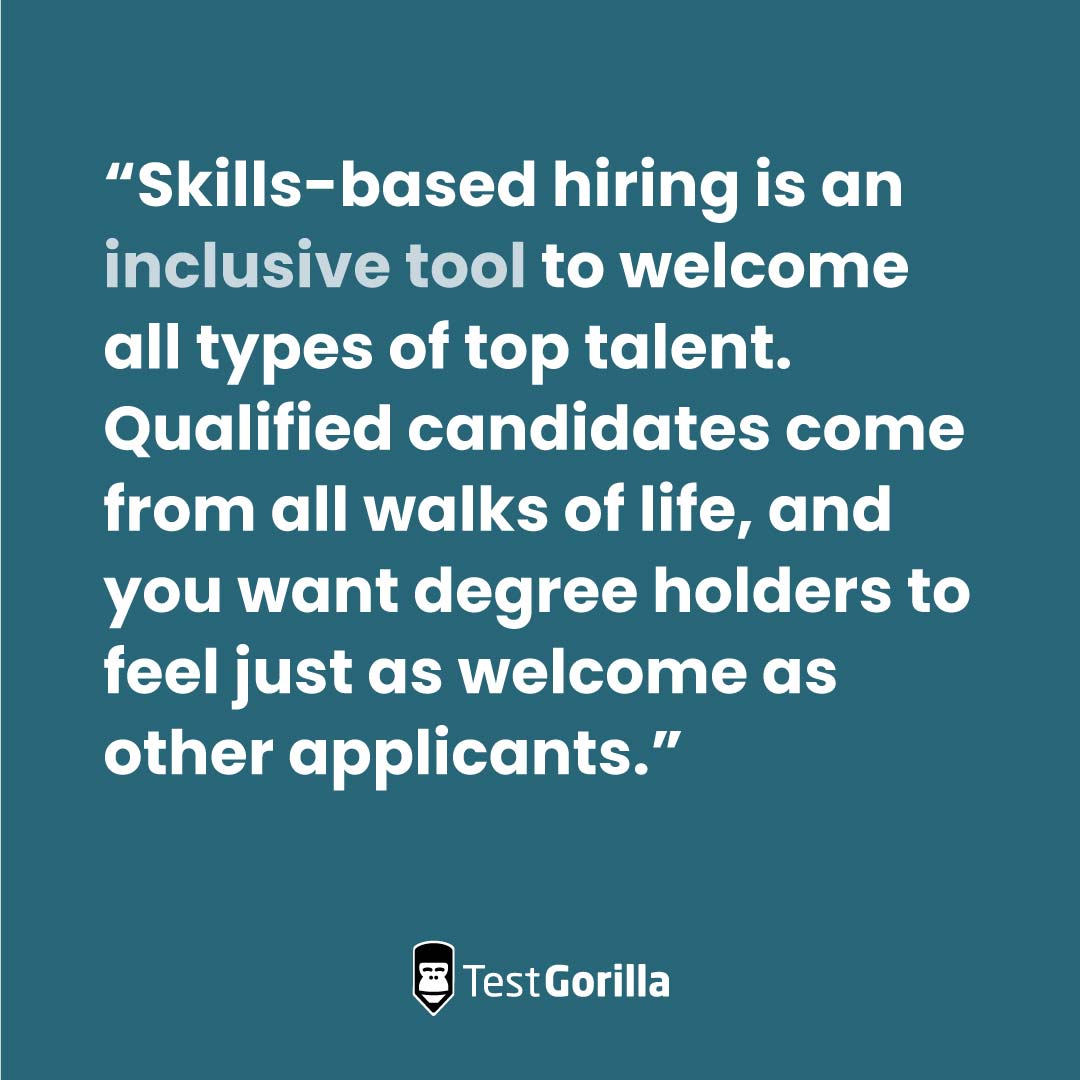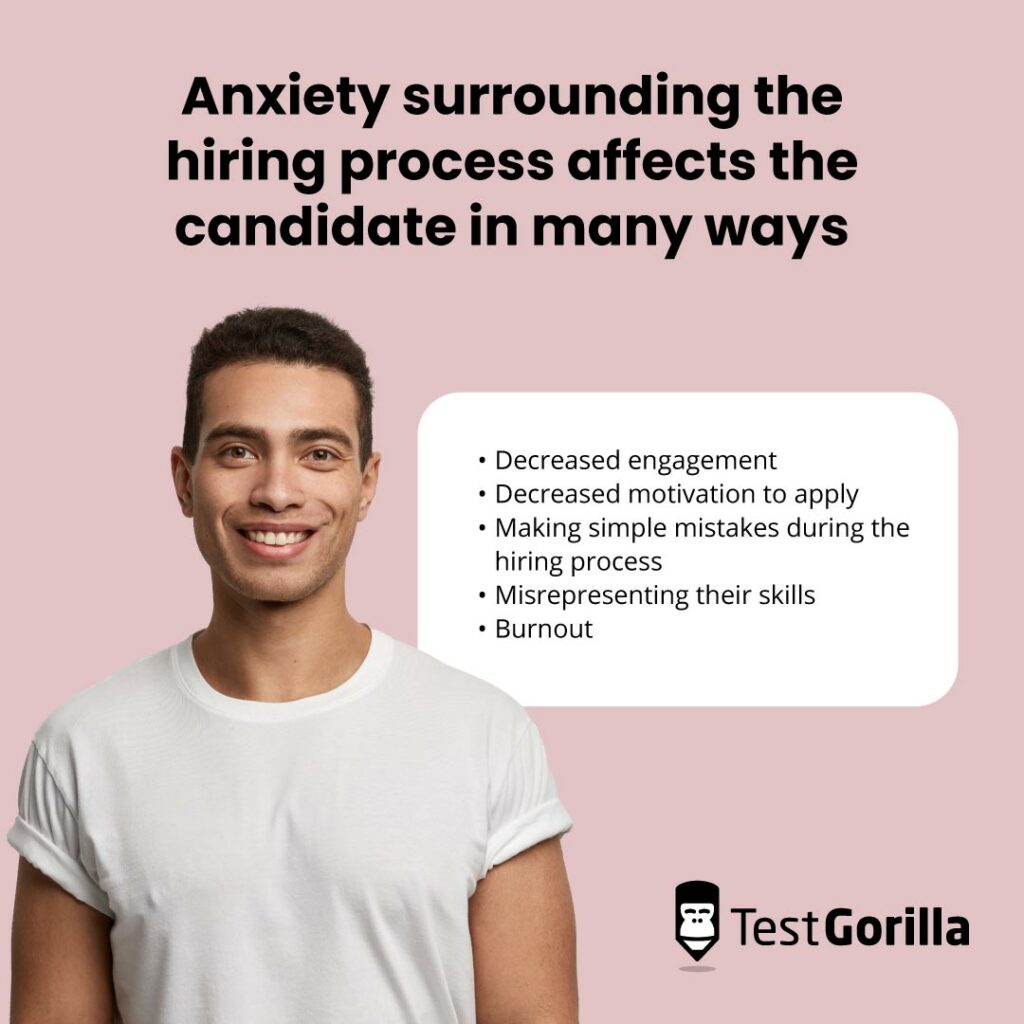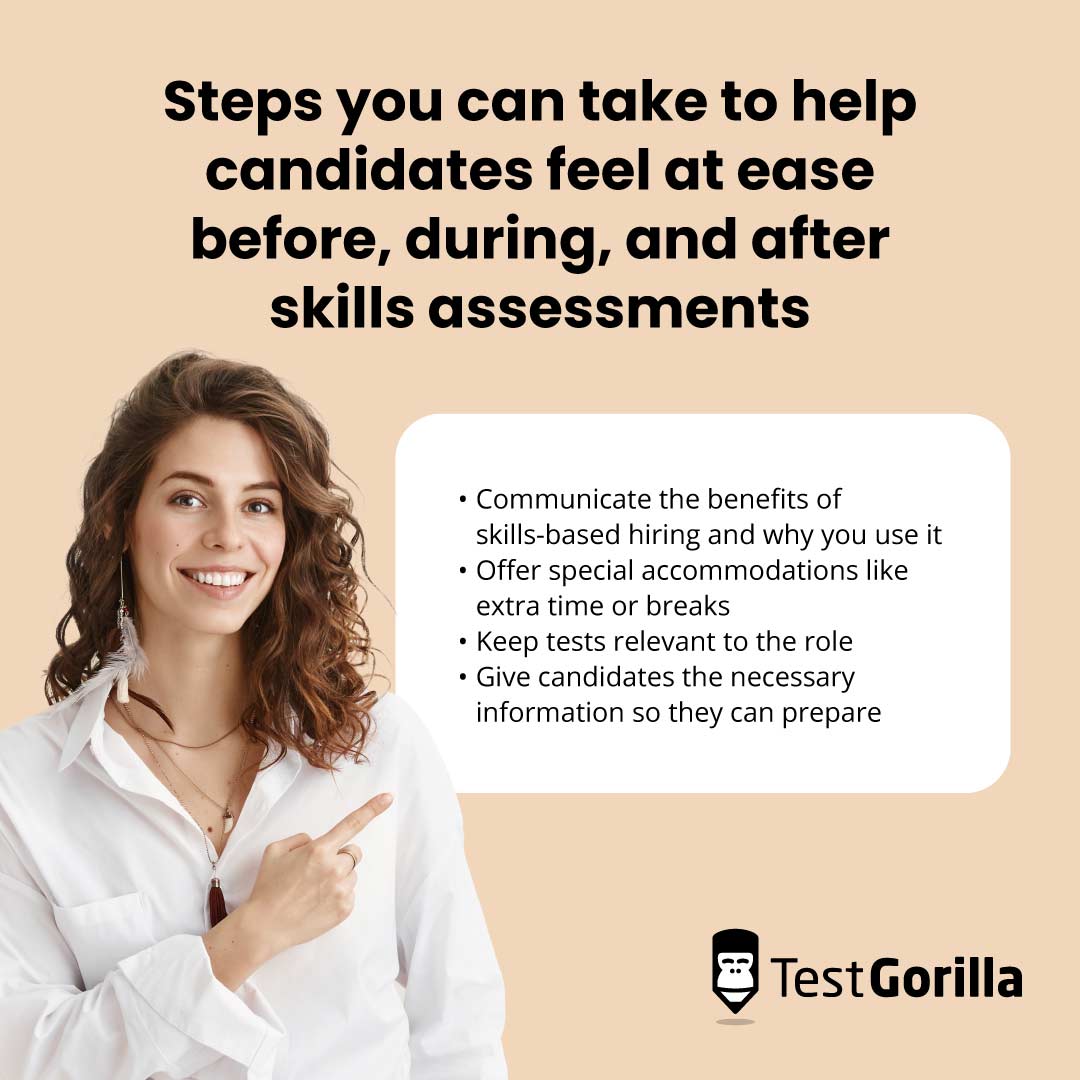Does skills-based hiring cause anxiety in candidates?
Job searching is synonymous with anxiety, and candidates everywhere get nervous about applying for a new role.
Add skills tests on top of that, and applying for jobs becomes a nightmare for certain applicants.
Skills-based hiring carries countless benefits for employees and employers alike, like reduced hiring bias and a wider talent pool, but it can trigger anxiety and apprehension in some candidates.
Anxiety may stem from the fact that a candidate is more accustomed to presenting degrees and experience, so they get nervous during tests, or they don’t believe that they can accurately display their skills.
Anxiety in the hiring process can lead to false negatives, just like overconfident applicants can lead to mis-hires.
Let’s analyze the possible anxiety skills-based hiring can cause, where it stems from, and how it compares to traditional hiring anxiety. Many of these factors can be alleviated or eliminated by proactive efforts on the employer’s side, so we’ll take a look at how to do that, too.
Table of contents
- How common is candidate anxiety in skills-based hiring?
- What causes anxiety in candidates?
- The potential impact of anxiety on the hiring process
- How skills-based hiring compares with traditional hiring methods in terms of anxiety
- How to reduce anxiety and make candidates feel at ease during skills-based hiring
- Use skills tests to change the future of job-hunting anxiety
- Sources
How common is candidate anxiety in skills-based hiring?
Job-hunting and anxiety go hand in hand. We’ve all felt a pang of nerves when searching for a new job, but full-on anxiety is more common than you might think.
Anxiety disorders are the most common mental health concern in America and affect 31.1% of the population.
Traditional hiring is heavily associated with anxiety – frankly, writing resumes, sending them out to potential employers, and waiting for a callback sucks.
But what do candidates think of skills-based hiring?
According to TestGorilla’s State of Skills-Based Hiring report, 54.3% of candidates prefer a hiring process with skills testing.
This preference doesn’t mean that applicants don’t experience anxiety with skills-based hiring, but it does mean that the majority believe that the nerves are worth it.
Why? Test results give more rigorous evidence of their skills than traditional methods like resumes and interviews. Some candidates feel anxiety, but, if they know they have the skills, being assessed and rewarded for their true capability gives a feeling of confidence unlike any other.
Many factors can contribute to skills test anxiety, such as bad experiences with tests, neurodivergence, and frustration with a new hiring process. Some candidates even think their degrees and academic achievements don’t matter anymore.
What causes anxiety in candidates?
Candidates may feel anxiety around skills tests for many reasons, which is why it’s one of the main concerns about skills-based hiring.
Some people experience trauma about test taking, and some, such as neurodivergent folks and individuals with difficult backgrounds, get nervous about timed tests.
Some select candidates also feel that a skills-based process devalues the education they worked so hard for.
Let’s talk about these elements in-depth.
Summary of the causes
Factor | Description |
Feeling like your education is useless or undervalued | Degree holders feel like skills-based hiring devalues their hard workAvoid phrases like “degrees don’t matter” to promote positivity |
Uncertainty of your skills and how to display them | Some candidates doubt their ability to display their skillsThis uncertainty affects younger and older generations, in particular |
Neurodivergence and disabilities | Neurodivergent candidates are more prone to anxietyNeurodivergent candidates may be afraid of being judged based on one “bad test” |
Difficult backgrounds, trauma, and anxiety around testing | Some candidates have bad experiences with outdated testing systemsCandidates may be “bad test-takers” |
Feeling like your education is useless or undervalued
A skills-based atmosphere can be intimidating, making some individuals feel like their efforts, experience, and education are worthless.
It also makes them feel like their mountains of school debt weren’t worth it.
Peter Hansen, an account executive at Wisq, believes that applicants feel uncomfortable with skills testing because it devalues their education.
Peter says phrases like “degrees don’t matter” or “degrees are overrated” demean the effort that the individual put into earning that degree. He believes degrees shouldn’t be a requirement for most positions, but an anti-qualification attitude could turn potential applicants off.
Instead, Peter recommends the phrase “degrees aren’t required.”
Degree holders worked and studied hard to get where they are and their knowledge is valuable. You must let them know that.
Skills-based hiring is an inclusive tool to welcome all types of top talent. Qualified candidates come from all walks of life, and you want degree holders to feel just as welcome as other applicants.
Uncertainty about your skills and how to display them
Skills-based hiring may cause anxiety because candidates aren’t confident in their skills, or they simply don’t know how to display them.
It’s a relatively new hiring process, so many applicants have never had to consider how to display their talent. Their resumes did that for them.
This concern affects the youngest and oldest generations in particular.
One study showed that 34% of Generation Z didn’t think they could use their existing skills in a job, 33% didn’t believe they could control the next steps in their careers, and more than half said they were anxious about the next steps in their professional life.[1]
Generally, Gen Z candidates aren’t self-confident about their skills, and skills testing could make them feel like they’re under scrutiny.
What about older workers?
Older generations may be worried about the current skills shortage and feel an urgency to upskill and reskill.
Workers who have spent their entire careers in one industry fear that their skills are obsolete or unfit. This anxiety tells them that a skills test could make them look inexperienced.
The fears of the younger and the older generation are both closely linked to impostor syndrome.
Impostor syndrome is the belief that your skills aren’t as great as others perceive them. Generally, these people believe they’re a “fraud” and that their supportive colleagues or bosses are “just being nice.”
The good news is that skills-based hiring is a great opportunity for people with impostor syndrome. They receive an objective assessment, enabling hiring managers to see their true talent.
For more information, read our article about skills-based hiring, impostor syndrome, and the Dunning-Kruger effect.
Neurodivergence and disabilities
Neurodivergent people and those with disabilities have brains that work differently than neurotypical ones.
Folks with neurodivergent brains may have increased anxiety around skills testing for a variety of reasons:
Overstimulation
Being overwhelmed
Fear of judgment
Fear of inaccurate representation
The last point is a common fear for neurodivergent people. You know you have the right skills, but you fear character misunderstandings or critical judgment because you have only one chance to prove yourself.
This fear is common, but it’s based on a misunderstanding. Skills-based hiring examines the whole candidate, considering technical skills, soft skills, and personality. This reason is why skills-based hiring is perfect as a part of the holistic hiring process.
Many of these points can also be tied to rejection-sensitive dysphoria (RSD), which is when an individual experiences an intense emotional response to criticism or rejection.
Anxiety is also more common in neurodivergent people. Autistic individuals are much more likely to have social anxiety, with a prevalence of 50%. In non-autistic folks, social anxiety ranges from 7% to 13%.[2]
Reducing anxiety in neurodivergent candidates and helping them feel more at ease is an important step to hiring a more diverse workforce.
For more information on the topic of neurodivergence and disability, read our articles on the ASD employment gap and disability inclusion in the workplace.
Difficult backgrounds, trauma, and anxiety around testing
Some applicants simply struggle with the idea of testing in general. These struggles generally occur because of a difficulty in their backgrounds.
This sort of anxiety applies to:
People suffering trauma
People who feel anxiety around tests (including bad “test-takers”)
People who have bad associations with assessments and testing
The competitive atmosphere of test-taking and scoring could evoke stressful memories of test-taking in education and previous job applications, where candidates were asked to complete seemingly random and unrelated tests to secure the position.
Old-fashioned aptitude tests where candidates received irrelevant “what would you do” questions, as well as random spatial and numeric reasoning questions, are part of this problem.
And some skills-based practices aren’t helping the matter. If they assess anxiety levels and the ability to perform in front of people, rather than capability, they’ve failed their purpose.
The ability to perform in front of people is still relevant for customer-facing roles, but when you assess this as a matter of course for all positions, it becomes problematic.
One study from North Carolina State University found that some so-called “skills-based hiring practices” assess confidence rather than relevant skills.
Their findings suggest that certain organizations evaluated programmers on how well they wrote on a whiteboard as they explained their work out loud.
This isn’t a routine task for a programmer; their ability to do their job isn’t determined by how well they can write on a whiteboard and talk about it.
These types of practices are giving skills-based hiring a bad name, and the association could give people the wrong idea and make them trust skills tests less.
The best insights on HR and recruitment, delivered to your inbox.
Biweekly updates. No spam. Unsubscribe any time.
The potential impact of anxiety on the hiring process
Anxiety can impact a hiring process, whether it’s traditional or skills-based – but what does that mean for you as a hiring manager or recruiter?
How does candidate anxiety affect your hiring process and its outcomes?
Let’s take a look at both points of view.
From a candidate’s point of view
Anxiety surrounding the hiring process affects the candidate in many ways, including:
Decreased engagement
Decreased motivation to apply
Making simple mistakes during the hiring process
Misrepresenting their skills
Burnout
Yes, applicants can get burnout just from job searching alone.
Reading dozens of job descriptions to find a relevant one, personalizing your resume for each company, sending out hundreds of applications only to receive one interview invitation… It’s overwhelming just thinking about it.
These consequences are important because they can easily cause more anxiety. Anxiety can cause candidates to make simple mistakes, generating more anxiety.
Self-propagating anxiety can go around in circles if you don’t take steps to mitigate it.
From an employer’s point of view
Anxiety and perceived confidence can heavily affect your hiring decisions, and the outcome can be detrimental. The two biggest issues are:
Missing out on top talent due to candidate anxiety
Mis-hiring because a candidate appears confident but isn’t as capable as you thought
These issues are directly related to the anxiety displayed during a job interview.
One study showed that anxiety can impact the interview process, but does not predict future job performance.
Judging a candidate based on how much anxiety they display could lead to a costly mis-hire. Candidate anxiety also affects diversity.
Anxiety has a large impact on female applicants: 84% of women believe they have the right skills to succeed, although they’re still much more anxious to make their next career move than men.[1]
This fact is only contributing to the gender employment gap. Increased diversity is one of the biggest benefits of skills-based hiring, but if you don’t take steps to mitigate anxiety, your DEI initiatives could suffer.
How skills-based hiring compares with traditional hiring methods in terms of anxiety
Traditional hiring methods have their share of anxiety – enough to create an entire stereotype about the stress of job hunting.
Traditional hiring still has many of the anxiety triggers mentioned above. It can still create a competitive atmosphere, produce anxiety and RSD in neurodivergent people, and trigger people with trauma.
But there’s more: It also has different triggers that aren’t a problem with skills-based hiring methods.
Traditional hiring has people worried about their background, their education, and their work history. Candidates wonder if their resume is “strong enough,” and many are concerned about whether they’ve gathered all their paperwork correctly (especially with portfolios).
Some people also believe they don’t possess the right “proof” to “convince you” that they have the right skills and they simply pass on the job. That means you miss out on top talent because they were too anxious to even apply.
One example is Reeves Blackwell, a training specialist, who speaks about her intense anxiety with a traditional system. Updating her resume and writing cover letters makes her feel like job searching is a full-time job in itself.
Reeves says that seeing certain job requirements alone makes her feel anxious.
Strict job requirements are nearly non-existent in skills-based hiring, which begs a good point.
Anxiety is present in all forms of hiring, but skills-based hiring can result in lower anxiety as long as you properly convey the benefits and make the necessary accommodations.
Let candidates know that the process is objective. The focus isn’t on how they present themselves, but rather on what their true skills are.
For details on the candidates’ views on skills-based hiring, read our article on skills-based hiring from a candidate’s perspective.
How to reduce anxiety and make candidates feel at ease during skills-based hiring
There are actionable steps you can take to help candidates feel at ease before, during, and after skills assessments.
Our top tips are to:
Communicate the benefits of skills-based hiring and why you use it
Offer special accommodations like extra time or breaks
Keep tests relevant to the role
Give candidates the necessary information so they can prepare
Let’s quickly discuss each of these.
Communicate the benefits of skills-based hiring to explain why you use it
It’s important to communicate the advantages of skills-based hiring to the candidate. Stress to them that you value accuracy, faster results and communication, objectivity, equality, and a better role fit.
Tell candidates that you value their skills, capabilities, and potential. Assure them that you’re doing this for them – it isn’t just an HR trend.
Offer special accommodations like extra time or breaks
Address differences and disabilities. Encourage applicants to use special accommodations like extra time, breaks, and text-to-speech readers.
These accommodations are available for a reason. Candidates with differences and disabilities should know they have access to a system that’s more compatible with how their brains work.
Keep tests relevant to the role
As mentioned above, many candidates have anxiety about testing owing to previous assessments that asked irrelevant questions.
You have a chance to keep assessments relevant to the role and improve the testing process for countless applicants.
Role-relevant tests reassure candidates and let them know the evaluation is fair. An example is assessing a programmer for JavaScript skills and attention to detail.
For more information on role-relevant assessments, read our skills assessments guide for recruiters.
Give candidates the necessary information so they can prepare
Give candidates plenty of information in advance about the tests you’re using so they can prepare themselves and get familiar with the process.
Tell candidates:
What to expect from the tests
How the results are measured
How long they’ll take
The more information you give them, the more helpful a role you’ll play in their test performance. Try giving them some sample questions and a general idea of what’s included in an assessment.
It’s also good to ensure you let them know that the results of these tests will be kept confidential and won’t be used for any other purposes outside your hiring process.
Non-disclosure is particularly important if a candidate decides to divulge something private, like a neurotype, to you.
Use skills tests to change the future of job-hunting anxiety
It’s possible for skills-based hiring to cause anxiety, but with the right steps, it can be more reassuring for candidates experiencing anxiety than traditional methods.
The key is to share the appropriate information with your candidates. Communicate your mission, relay the benefits, and offer accommodations wherever you can.
Ready for the next step? Let’s address the impact of confidence in an interview and how anxiety can influence the interview process.
If you’re looking to browse through our skills tests and plan your next pre-employment assessment, check out our test library.
Sources
“Global Study By LHH Reveals Worker Readiness And Key Concerns For The Future Of Work”. (March 16, 2022). PR Newswire. Retrieved March 1, 2023. https://www.prnewswire.com/news-releases/global-study-by-lhh-reveals-worker-readiness-and-key-concerns-for-the-future-of-work-301504085.html
Spain, Debbie. (August, 2018). “Social anxiety in autism spectrum disorder: A systematic review”. Science Direct. Retrieved March 1, 2023. https://www.sciencedirect.com/science/article/pii/S1750946718300643#bib0245
You've scrolled this far
Why not try TestGorilla for free, and see what happens when you put skills first.

















